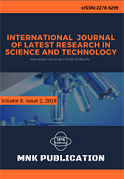DOI:10.29111/ijlrst ISRA Impact Factor:3.35, Peer-reviewed, Open-access Journal
Research Paper Open Access
International Journal of Latest Research in Science and Technology Vol.4 Issue 5, pp 115-125,Year 2015
Correspondence should be addressed to :
Received : 21 October 2015; Accepted : 26 October 2015 ; Published : 31 October 2015

| Download | 125 |
|---|---|
| View | 179 |
| Article No. | 10579 |
Inequality and wealth distribution have been widely researched. However there is a lack of attention of these issues within the field of innovation studies. Recent trends on innovation studies have pinpointed the necessity to strengthen research programs about innovation for disfavored populations around the world. A recent research area has focused into inclusiveness and social development. Two main orientations have been identified: (i) Innovation requires involvement of people affected in the demand definition, as well as in the solving of processes to become an inclusive innovation problem. (ii) Inclusive development is oriented to identify and establish solutions for problems that affect marginalized populations. In addition we found a variety of categories to study the problem: inclusive innovation, innovation for inclusive development, innovation for social development, innovation for the population at the bottom of the pyramid, among others. This research explored four Mexican innovation experiences in the health sector from the perspective of inclusive development. Imitation, training and low cost studies and solutions were key points in these cases. In the health sector, it is very difficult for marginalized populations to collaborate extensively in the processes and solutions to solve their medical problems. To find these solutions, the participation of experts (researchers and physicians) and the role of intermediate organizations become very relevant: universities and public research centers, non governmental organizations, associations and local governments are all fundamental to achieve innovation efforts and develop knowledge to solve health demands for disadvantaged populations. This article presents a variety of participants and crucial processes like learning and social capital construction as key points of innovation for inclusive development.
Copyright © 2015 José Luis Sampedro Hernández et al. This is an open access article distributed under the Creative Commons Attribution 4.0 International (CC BY 4.0) license which permits unrestricted use, distribution, and reproduction in any medium, provided the original work is properly cited.
José Luis Sampedro Hernández, Claudia DÃaz Pérez , " Inclusive Development Through Innovation: Solutions For Public Health Issues ", International Journal of Latest Research in Science and Technology . Vol. 4, Issue 5, pp 115-125 , 2015

MNK Publication was founded in 2012 to upholder revolutionary ideas that would advance the research and practice of business and management. Today, we comply with to advance fresh thinking in latest scientific fields where we think we can make a real difference and growth now also including medical and social care, education,management and engineering.

We offers several opportunities for partnership and tie-up with individual, corporate and organizational level. We are working on the open access platform. Editors, authors, readers, librarians and conference organizer can work together. We are giving open opportunities to all. Our team is always willing to work and collaborate to promote open access publication.

Our Journals provide one of the strongest International open access platform for research communities. Our conference proceeding services provide conference organizers a privileged platform for publishing extended conference papers as journal publications. It is deliberated to disseminate scientific research and to establish long term International collaborations and partnerships with academic communities and conference organizers.